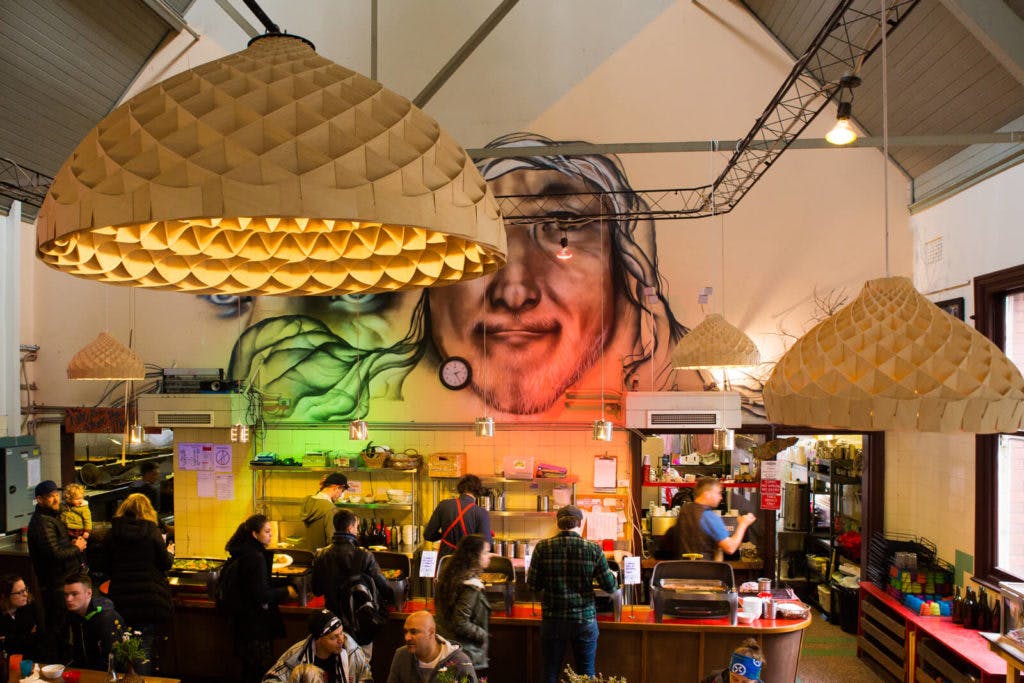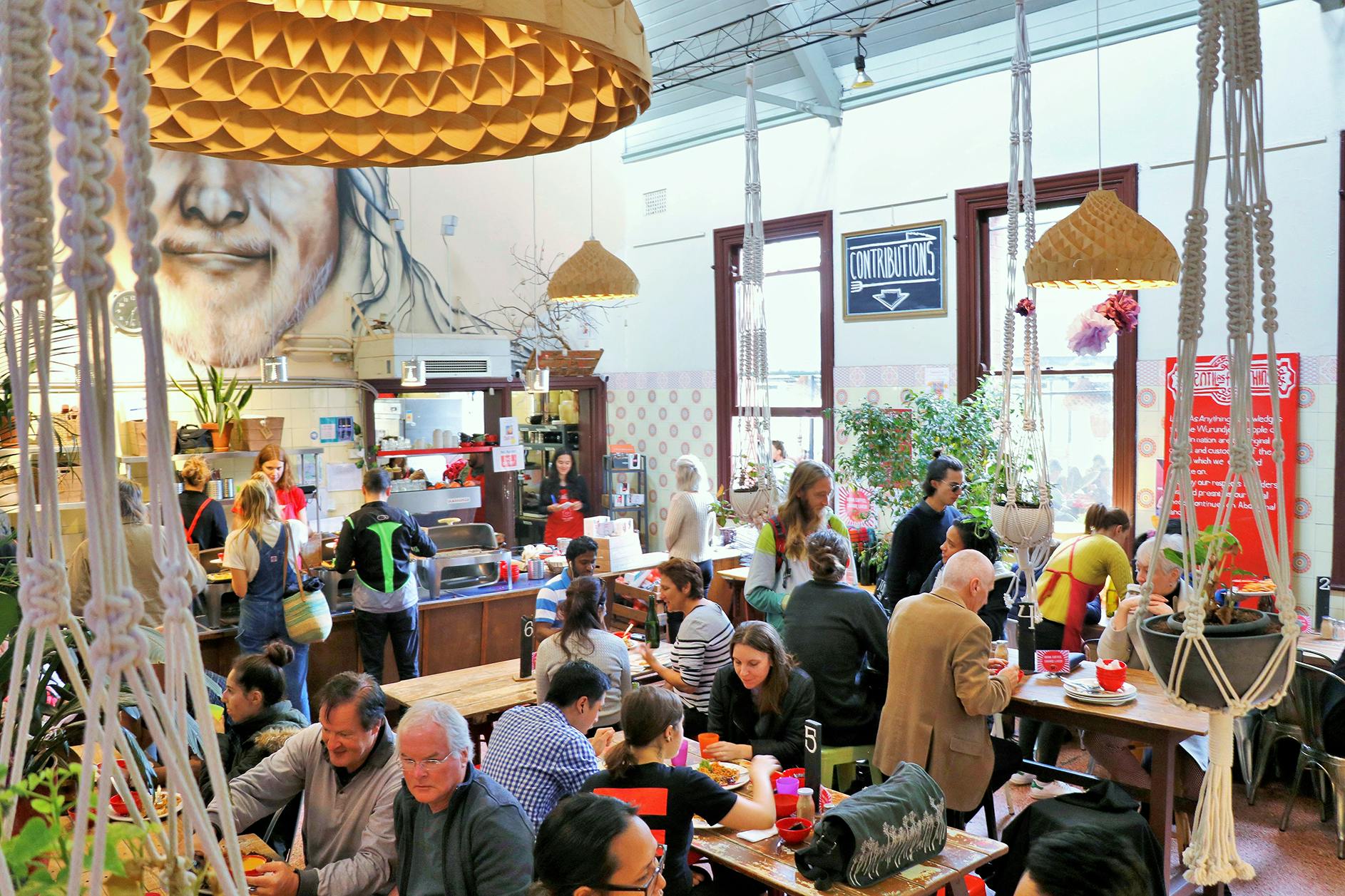HERE’S THE WORST ELEVATOR pitch you’re going to read today: Let’s take a bunch of garbage, put it on a plate, and ask people to eat it. Then, if they feel like it, they can give us some money.
Welcome to Lentil as Anything, the Australian restaurant chain that’s turned freeganism into a business model. These four community cafés, spread across Melbourne and Sydney, serve nutritious vegan meals using donated produce and volunteer labor, asking that patrons contribute only what they feel the food is worth.
An unlikely recipe for financial success, but Lentil as Anything is as well-regarded for its cuisine as it is for its social ventures. In 2018, the chain expanded further, opening a grocery (the “Inconvenience Store”) under the same pay-what-you-want model.
“Lentil as Anything opened its first restaurant in 2000, so we’ve been going for 18 years,” says the store’s project manager, Astrid Ryan. “As a not-for-profit, we don’t receive any government funding or any assistance outside of specific grants that we would apply for, if we wanted to open another restaurant or something like that. So between the four restaurants, one restaurant might be doing better and may be able to cover the cost of another restaurant, which could be going through a lull in terms of contribution. That’s how we keep ourselves sustainable.”
The scale of the operation provides some insurance against an underperforming location, but to really understand Lentil’s success, you need to take a look at founder Shanaka Fernando.
Fernando is appropriately weird. A law school dropout, he was living in a tent on the beach when he started the first restaurant. Since then, he’s been handed an award by Australia’s prime minister, bankrupted by the tax office, and appeared on a reality television cooking show with the Dalai Lama. He named his eatery after Australian rock band Mental as Anything, probably best known internationally for its contributions to the soundtrack of the 1986 film Crocodile Dundee.
It’s perhaps unsurprising that a man motivated by Buddhist philosophy would opt to launch a social venture, rather than a traditional restaurant. But his decision to incorporate a pay-what-you-want (PWYW) model could easily have been disastrous in other hands.
Transactions in which the buyer has an element of control over value (“participatory pricing”) are common enough. Common examples might include stock exchanges and auctions, or haggling or tipping. But PWYW tilts the pricing power dynamic all the way to the consumer. Purchasers have absolute power to determine how much—if anything—they’re willing to pay.
THERE HAVE BEEN A FEW HIGH-PROFILE PWYW ventures over the years, particularly in digital publishing (Radiohead’s In Rainbows springs to mind, as does video game distributor Humble Bundle). Some museums have offered PWYW admission at certain times. And while far from common, you can find other PWYW eateries dotted across the world: soup kitchens, community cafés, even some high-end dining experiments.

It’s rare, however, to find one with the resilience and success of Lentil, which serves up a million meals a year across its four locations. Only 55 percent of hospitality businesses survive their first four years of trading, according to the Australian Bureau of Statistics, and almost 16 percent of restaurants and cafés across the country were shuttered in 2016–17. Close to 20 years of serving about 700 customers per day, per venue, puts Lentil as Anything in rare company.
“There’s always a lot of interest in the media … to try and understand: How does it work?” says Ryan. “When you give people the opportunity to be good and to share their abilities, they’ll do it. The goodwill will always be there. And people are drawn to it because they’re just fascinated by the concept. … They want to be part of something unusual or unpredictable, or they want to prove other people wrong.” She continues wryly, “It goes against everything in the traditional capitalist model, so it seems like quite a miracle that it’s still going.”
Although Lentil has long used donated ingredients, a recent surge in the awareness of food waste has generated interest in the practice. Studies on the scale of food waste tend to produce wildly varying figures. But almost all discussion starts with an influential 2011 study from the United Nations’ Food and Agriculture Organization, which estimated that about a third of food produced for human consumption ends up as trash. In developing countries, this is because of “food loss” issues such as spoilage at the point of production or transport, which renders food inedible. But in developed economies, food waste is mostly generated by retailers and consumers.
“Consumers have incredibly high cosmetic standards for fruit and vegetables,” says Ryan. “So the food will be perfectly good; it might just have a bruise on it, or be bent in the wrong way, or be slightly the wrong color. It’s still perfectly edible and nutritious. … It just doesn’t meet these very artificial, perfectionist cosmetic standards.”
Lentil as Anything takes a couple of different approaches to minimizing food waste. First, it partners with food rescue organizations to source produce that would otherwise be discarded. Surplus stock from supermarkets, wholesalers, and even farmers—food that would otherwise rot in the fields or end up in landfill—forms the basis of Lentil’s menu. Taking such food provides administrative, financial, and social benefits for “shops or markets … that want a solution to their food waste,” says Ryan.
AT THE OTHER END, KITCHEN SCRAPS AND leftovers are composted on-site and used at a nearby community garden that “grows herbs, vegetables, plants, succulents, everything,” says Ryan. “We have a great closed-loop system where we provide them with compost, they use the compost to grow more food for the restaurant, they bring it in, and we serve it up to the community.”
For those concerned about waste, Lentil as Anything has a proven model in place for those bold enough to try it. Agribusiness, retailers, and governments may be sincere about their attempts to tackle food waste, but inertia and bureaucracy mean it’ll be a while before we see any outcomes. It’s easier to get results at the consumer level, where simple behavioral changes can have big effects for individuals and communities. In the case of food waste, the old adage “think global, act local” may form a valid strategy.










